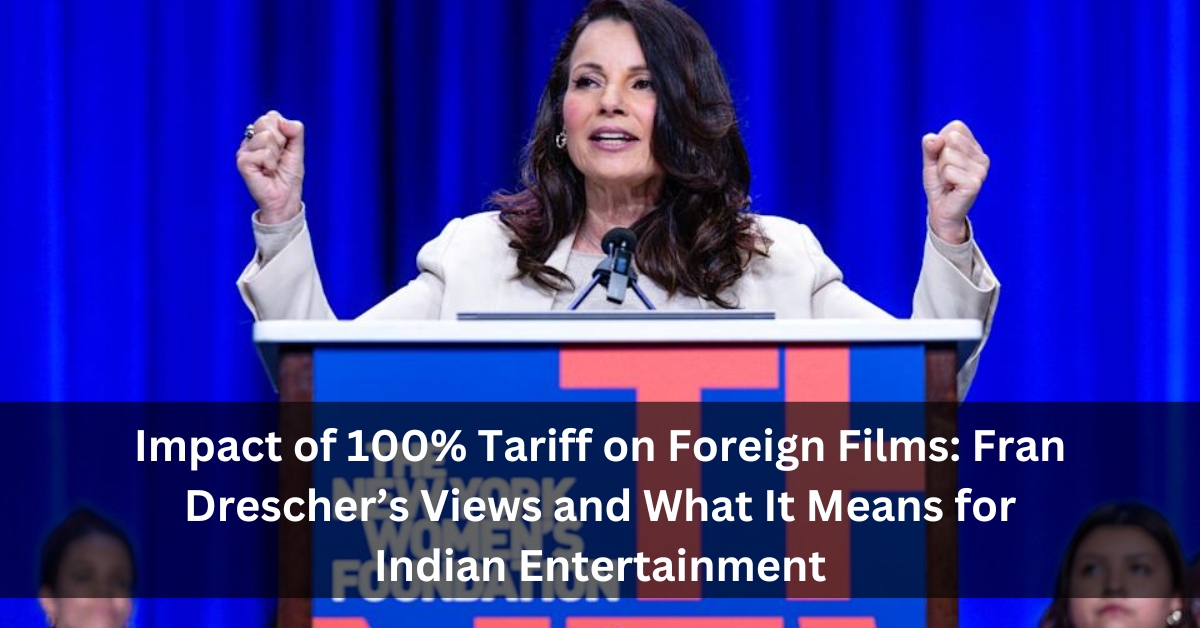Impact of 100% Tariff on Foreign Films: Fran Drescher’s Views and What It Means for Indian Entertainment
The entertainment industry is in the middle of a big shake-up, and it’s not just about new movies or box office numbers. Recently, former U.S. President Donald Trump made headlines again—this time for proposing a 100% tariff on foreign-made films. This move has not only sparked global debates but also drawn strong reactions from Hollywood insiders like Fran Drescher. What does this mean for Indian movie lovers and filmmakers? Blog Lovin breaks it down in simple language.
What Is the 100% Tariff on Foreign Films?
Let’s understand the basics first. A tariff is a kind of tax added to imported goods. In this case, it means any movie not made in the USA would cost 100% more to enter the American market. This includes films made in countries like the UK, Canada, Australia, and yes—even India.
So, if a movie costs ₹50 crore to produce abroad, the studio will have to pay double that amount (₹100 crore) to release it in U.S. cinemas. That’s a huge financial burden.
Why Did Trump Propose This?
The official reason given by Trump is to protect American jobs and revive local movie production. According to him, too many American movies are now being shot outside the U.S. to save money. Countries like Canada and the UK offer tax breaks, cheaper labour, and beautiful filming spots, which attract Hollywood studios.
Trump says these foreign incentives are “killing” American jobs in the film sector. His solution? Make foreign films so expensive to release in the U.S. that studios are forced to produce movies on home soil.
Fran Drescher Speaks Up
Fran Drescher, best known for her hit show The Nanny and now President of the Screen Actors Guild (SAG-AFTRA), strongly disagrees with the tariff idea. In a recent statement, she said:
“Instead of punishing studios with tariffs, we should encourage them to stay by giving tax breaks and local support.”
She believes that such extreme policies will hurt creativity, global partnerships, and even the reputation of Hollywood. Drescher also pointed out that film is a global art form and blocking international content is not the right answer.
Her suggestion? Offer American filmmakers better deals at home so they don’t feel the need to go abroad.
How the Global Film Industry Is Reacting
The entertainment world is watching this tariff plan closely. Here are some key reactions:
- UK and Australia: These countries often host Hollywood film crews. A 100% tariff could mean losing major business and job opportunities.
- France and Italy: Known for their artistic cinema, these nations worry that American audiences may no longer get to see their films due to high costs.
- Hollywood Studios: Most studios are silent for now, but insiders say many are unhappy. A few are even considering releasing fewer movies internationally to avoid extra expenses.
What This Means for Indian Films and Audiences
Let’s bring this closer to home.
India’s film industry is one of the largest in the world. Bollywood, Tollywood, and other regional cinemas have strong fan bases across the globe, including in the U.S. Many Indian films are released in American theatres, especially in areas with big Indian communities.
If this 100% tariff is approved:
- Fewer Indian films may release in the U.S.
- Ticket prices for Indian films could become too high for American audiences.
- Co-productions between Indian and U.S. companies might reduce.
- Indian filmmakers may lose out on U.S. revenue and exposure.
So, while this move is aimed at American films shot abroad, it could also hurt the global reach of Indian cinema.
Are There Better Alternatives?
Many experts, including Fran Drescher, believe that the tariff is not the right tool for this problem. Instead, they suggest:
- Providing tax incentives for studios that shoot in the U.S.
- Building more advanced film studios in America
- Promoting job training in the entertainment sector
- Supporting global collaboration instead of limiting it
These steps can help local workers without isolating international partners.
Final Thoughts
The proposed 100% tariff on foreign-made films is a bold step, but it comes with many risks. It may protect some U.S. jobs, but it also threatens the global flow of creative content. Voices like Fran Drescher’s remind us that cooperation is better than isolation in the world of art and cinema.
For Indian movie lovers, this issue is important. It’s not just about Hollywood—it’s about whether your favourite Hindi, Tamil, or Telugu film can be seen by your cousin in New York or a fan in California.
As always, Blog Lovin will keep you updated on how this global drama unfolds.
✅ Bookmark Blog Lovin
✅ Get the latest on film news, stars, and entertainment policy
✅ Stay informed without the jargon – only simple, real talk here!







